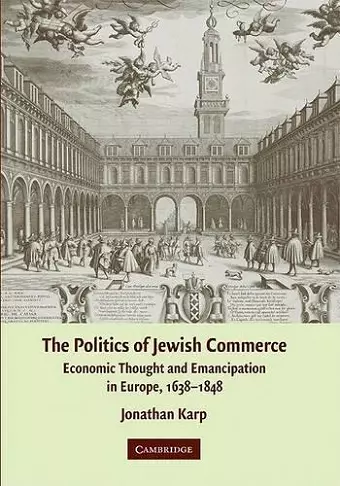The Politics of Jewish Commerce
Economic Thought and Emancipation in Europe, 1638–1848
Format:Hardback
Publisher:Cambridge University Press
Published:21st Jul '08
Currently unavailable, and unfortunately no date known when it will be back
This hardback is available in another edition too:
- Paperback£45.00(9781107407800)

This book examines the centrality of economics in European attitudes toward Jews from 1638–1848.
By focusing on economic attitudes toward Jews, this book illuminates European intellectual approaches toward economic modernity, measured against traditional political and constitutional ideals. By elucidating these general debates, it renders contemporary Jewish economic self-conceptions fully explicable for the first time.This study demonstrates the centrality of economic rationales to debates on Jews' status in Italy, Britain, France and Germany during the course of two centuries. It delineates the common themes that informed these debates - the ideal republic and the 'ancient constitution', the conflict between virtue and commerce, and the notion of useful and productive labor. It thus provides an overview of the political-economic dimensions of Jewish emancipation literature of this period. This overview is viewed against the backdrop of broader controversies within European society over the effects of commerce on inherited political values and institutions. By focusing on economic attitudes toward Jews, the book also illuminates European intellectual approaches toward economic modernity. By elucidating these general debates, it renders more contemporary Jewish economic self-conceptions - and the enormous impetus that Jewish reformist movements placed on the Jews' economic and occupational transformation - fully explicable.
Review of the hardback: 'Jonathan Karp's book is an erudite, elegant, and insightful study of the centrality of economics to political thought in western Europe from the seventeenth through nineteenth centuries. Skillfully blending together a vast range of primary sources in six languages, Karp argues convincingly that Judaism and the Jews served as prisms through which the spectrum of Enlightenment thought was filtered.' Derek Penslar, University of Toronto
Review of the hardback: 'A heavy baggage of stereotyping and awkwardness hangs over discussion of the history of attitudes toward Jewish commerce: scholars tend either to shy away from the topic, or to explore it almost exclusively through the limiting lens of the history of anti-Semitism. In this important, ambitious, and pathbreaking book, Jonathan Karp does neither. Drawing connections between a wide range of interpretive perspectives on Jews and commerce - Jewish and non-Jewish, positive and critical, pro-capitalist and anti-capitalist, Italian, French, English, and German - Karp ambitiously takes on a long period of more than two centuries, straddling the early modern/late modern divide. This is an important strength of his study, enabling him to provide a deep exploration of the roots of the emergence of the more familiar economic associations with Jews in the period since 1848.' Adam Sutcliffe, King's College London
Review of the hardback: 'This original and very well-written book starts from the clever insight that the singular concentration of Jews - for historical reasons - in commerce and finance made non-Jewish theorists and practitioners rethink their ideas about the role of money in human affairs. The Jews in commerce serve as a mirror in which the historian discerns aspects of early modern economic thought that would never come to light in any other way. The Jews and their activities represent stages on the road to modernity, and as they adapt, non-Jewish economists and thinkers arrive at new views about economic development.' Jonathan Steinberg, University of Pennsylvania
Review of the hardback: 'Magisterial …' The Leo Baeck Institute Newsletter
Review of the hardback: 'Rarely have scholars undertaken, as Jonathan Karp does in this new book, to position the ongoing debates on Jewish emancipation within larger debates over trade, commerce, and political economy within European intellectual history. And no scholar to date has done so in such a wide-ranging and thorough manner as Karp, looking at so many different national contexts and at such a broad field of early modern history. This is … a major book that should be required reading for scholars and graduate students in Jewish history, in early modern history more generally, and in the history of Western economic thought.' The International History Review
Review of the hardback: 'The Politics of Jewish Commerce is an important and stimulating contribution to at least three areas of study - Jewish history, modern economic thought, and the Enlightenment. Its value lies in the originality of its perspectives, which flow from the author's excellent decision to adopt an intellectual-historical approach to European economic thought in the period 1650 to 1850 insofar as it relates to the political debate about the place of Jews in modern society.' Journal of Interdisciplinary History
Review of the hardback: 'This original and thoroughly researched book carefully analyzes debates surrounding the place and role of 'the Jews' in the economy of early modern Western Europe. The end result is a convincing, fresh and careful analysis of three related but potentially explosive topics that are rarely dealt with appropriately in academia and beyond: Jews, money and modernity. This is a convincing, learned and path-breaking analysis of several different, yet related, fields that add significantly to the study of early modern Europe, the birth of modern economic and political thought, and the place and role of 'the Jews' in all three of these discourses.' Religious Studies Review
ISBN: 9780521873932
Dimensions: 229mm x 152mm x 25mm
Weight: 660g
388 pages